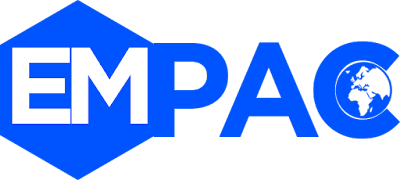CLICK HERE AND APPLY FOR ADMISSION
In an era where digital transformation dictates the pace of industries, E-Business stands tall as a monumental pillar behind many of today's business successes. From small-scale startups reaching global audiences to traditional enterprises evolving into e-commerce giants, the essence of E-Business is evident. For those with the ambition to spearhead this transformation, EMPAC's E-Business course emerges as an essential choice.
Why E-Business?
E-Business
is not just about online sales or digital marketing; it encapsulates a holistic
approach to business in the digital age. It’s about leveraging technologies,
understanding evolving consumer behavior, and adapting traditional business
models into agile, internet-driven paradigms.
Why EMPAC?
EMPAC,
with its track record of excellence, is uniquely positioned to offer an
unparalleled E-Business course that is both comprehensive and relevant. Here's
why:
Industry-Relevant
Content
At EMPAC,
we understand that the world of E-Business is ever-evolving. Hence, our
curriculum is not just rooted in theory but is perpetually updated to mirror
real-world industry shifts, ensuring that our students are always ahead of the
curve.
Experienced Faculty
Learning
from the best is not a luxury at EMPAC; it's a given. Our faculty members are
industry stalwarts with vast experience in the world of E-Business. Their
insights, combined with EMPAC’s progressive teaching methods, provide a
learning experience like no other.
Hands-on Approach
Beyond the
lectures and presentations, EMPAC believes in the power of hands-on learning.
Students will be engaged in real-world projects, simulations, and case studies,
giving them invaluable practical experience.
Networking Opportunities
Being a
part of EMPAC means having access to a network of alumni and industry experts
who are leaders in their respective domains. This networking ecosystem offers
students unparalleled opportunities for internships, collaborations, and even
future employment.
Cutting-edge
Infrastructure
EMPAC
prides itself on providing students with access to state-of-the-art facilities
and tools. Our digital labs, coupled with the latest software and platforms,
ensure that students have everything they need to explore the depths of
E-Business.
Conclusion
In a world
where digital proficiency is not just preferred but necessary, equipping
oneself with knowledge and skills in E-Business is paramount. EMPAC's
E-Business course offers not just education, but an experience that paves the
way for a promising career in the digital business realm. Whether you are a
budding entrepreneur, a business professional looking to shift gears, or
someone curious about the digital business world, this course is your gateway
to endless opportunities.
CLICK HERE AND APPLY FOR ADMISSION
For those keen on
exploring the course in detail, the comprehensive curriculum is provided below.
1. Introduction to
E-Business
1.1.
Definition and Evolution of E-Business
1.2. Difference between E-Business and E-Commerce
1.3. Advantages and Disadvantages of E-Business
1.4. Types of E-Business Models
1.5. E-Business vs. Traditional Business
2. Technologies in
E-Business
2.1.
Introduction to Internet Technologies
2.2. Web Hosting and Domains
2.3. Web Design Basics (HTML, CSS)
2.4. Basics of Databases (e.g., MySQL)
2.5. Mobile Technologies and E-Business
3. E-Business
Infrastructure
3.1. Web
Servers and E-Business Applications
3.2. Payment Gateways and Methods
3.3. Security Protocols (e.g., SSL, TLS)
3.4. E-Business Software Solutions (e.g., CRM, ERP, CMS)
3.5. Cloud Computing in E-Business
4. E-Commerce
4.1.
E-Commerce Models (B2B, B2C, C2C, etc.)
4.2. Developing an E-Commerce Website
4.3. E-Commerce Payment Solutions
4.4. Shopping Carts and E-Commerce Platforms
4.5. Customer Reviews and Feedback in E-Commerce
5. Digital Marketing and
E-Business
5.1.
Basics of Digital Marketing
5.2. Search Engine Optimization (SEO)
5.3. Pay-Per-Click Advertising (PPC)
5.4. Social Media Marketing
5.5. Email Marketing
5.6. Content Marketing and Blogging
5.7. Affiliate Marketing in E-Business
6. Legal and Ethical
Issues in E-Business
6.1.
Online Privacy and Data Protection
6.2. Intellectual Property Rights (Copyright, Trademark)
6.3. E-Contracts and E-Signatures
6.4. Taxation and E-Business
6.5. Ethical Considerations in E-Business
7. E-Business Strategy
and Planning
7.1.
Business Model Canvas for E-Business
7.2. Market Research and Analysis
7.3. E-Business SWOT Analysis
7.4. Developing an E-Business Plan
7.5. Growth Hacking Strategies for E-Business
8. Mobile Commerce and
E-Business
8.1.
Introduction to Mobile Commerce
8.2. Advantages of Mobile Commerce
8.3. Mobile Payment Solutions
8.4. Designing for Mobile Commerce (Responsive Design)
8.5. Mobile Commerce Marketing Strategies
9. E-Business Analytics
and Metrics
9.1.
Introduction to Web Analytics
9.2. Key Performance Indicators (KPIs) for E-Business
9.3. Tools for Web Analytics (e.g., Google Analytics)
9.4. Conversion Rate Optimization (CRO)
9.5. A/B Testing in E-Business
10. Advanced E-Business
Strategies
10.1.
Omnichannel Retailing
10.2. Personalization and AI in E-Business
10.3. Blockchain and E-Business
10.4. Virtual Reality (VR) and Augmented Reality (AR) in E-Business
10.5. E-Business in the Era of the Internet of Things (IoT)






0 Comments